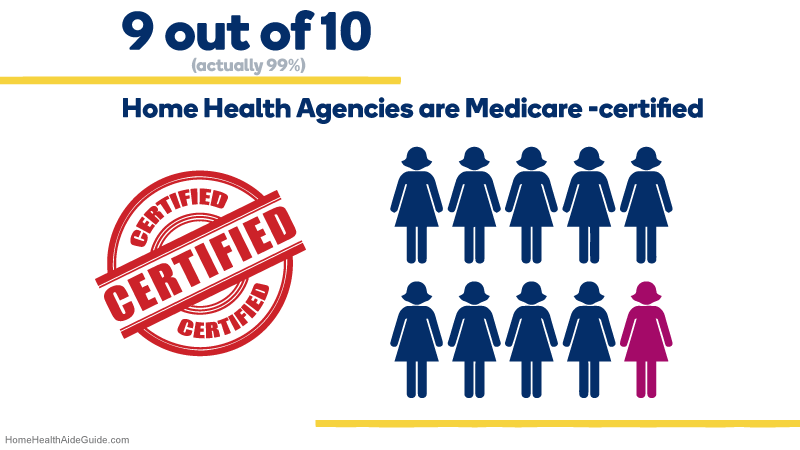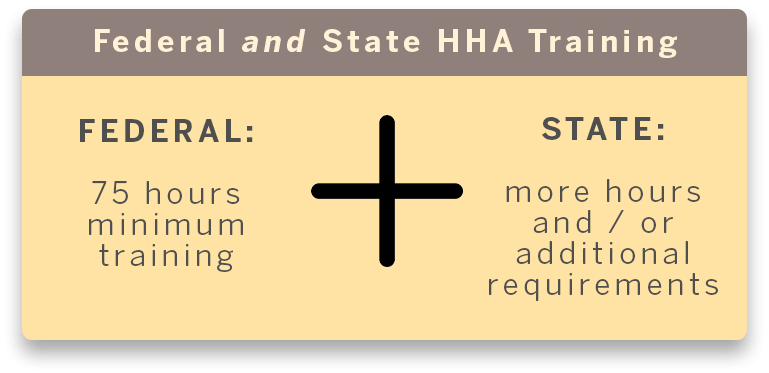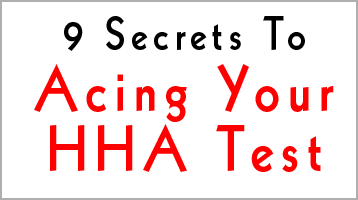Federal Home Health Aide Qualifications
The federal government provides qualification guidelines for home health aides (HHA)
Introduction
It can be confusing to determine the qualifications and training home health aides (HHA) need.
Some folks get their home health aide certificate online while most people attend a training program. And while there are no formal education needs to be a home health aide there are certainly minimums to which one must adhere.
The Code of Federal Regulations (Section 484.80) provides the qualification guidelines for home health aides.
These regulations are for aides providing care for home health agencies certified by the Centers for Medicare and Medicaid Services (CMS) – this is 9 out of 10 agencies in the country.

In Summary
There are four (4) ways in which a home health aide can become certified and qualified.
How To Be Certified and Qualified as a
Home Health Aide – 4 Ways
 Training and Competency Evaluation The candidate (i.e. the person wishing to be a HHA) needs to complete a training and competency evaluation program offered by a home health agency.
Training and Competency Evaluation The candidate (i.e. the person wishing to be a HHA) needs to complete a training and competency evaluation program offered by a home health agency.
 Competency Evaluation The candidate may complete a competency evaluation program only; this assumes the person has had the training to address specified topics in paragraph (b) of this section.
Competency Evaluation The candidate may complete a competency evaluation program only; this assumes the person has had the training to address specified topics in paragraph (b) of this section.
 Nurse Aide Training and Competency Evaluation A nurse aide who completes a nurse aide training and competency evaluation program; he/she must be in good standing in the state nurse aide registry.
Nurse Aide Training and Competency Evaluation A nurse aide who completes a nurse aide training and competency evaluation program; he/she must be in good standing in the state nurse aide registry.
 State Licensed Program The candidate may also complete a state administered program that licenses or certifies home health aides; must meet or exceeds the federal requirements.
State Licensed Program The candidate may also complete a state administered program that licenses or certifies home health aides; must meet or exceeds the federal requirements.
The agency is responsible for ensuring that any home health aide, employed by the agency directly or under arrangement, who provides aide services for the agency meets the provisions of these regulations – both federal and state.
The home health agency must ensure that each of its healthcare workers is qualified to deliver the treatment they’re assigned to patients, in a safe environment, effectively, and thoroughly.
In situations where the state requires state-level education, training, competency evaluations, certification, and supervision, those state requirements are paramount. In instances where the federal requirements are stricter, those federal requirements would take priority.
TO THE POINT
Any state HHA requirement that is more stringent than the federal requirement takes precedence over the federal requirement. Conversely, any federal requirement that is more stringent than a state requirement will take precedence over the more lenient state requirement.
For example, since California requires a minimum of 120 hours of HHA training this supersedes the federal minimum of 75 hours.
Bottom line? If you work in California as a home health aide, you need at least 120 hours of training.

Regulation Details
Of course, with any regulation, law, or code there are lots of details. And over the years Section 484.80 has been updated and tweaked.
But, remember, it’s the agency’s responsibility to adhere to these regulations. An aspiring home health aide can let them iron out all the details regarding the training and testing.
Here are additional details on the home aide training, competency evaluation, nurse aide training and state licensure.
Training
Content and duration of home health aide classroom and supervised practical training.
- Home health aide training must include classroom and supervised practical training in a practicum laboratory or other setting in which the trainee demonstrates knowledge while providing services to an individual under the direct supervision of a registered nurse, or a licensed practical nurse who is under the supervision of a registered nurse. Classroom and supervised practical training must total at least 75 hours.
- A minimum of 16 hours of classroom training must precede a minimum of 16 hours of supervised practical training as part of the 75 hours.
- A home health aide training program must address each of the following subject areas:
- Communication skills, including the ability to read, write, and verbally report clinical information to patients, representatives, and caregivers, as well as to others on the home care team.
- Observation, reporting, and documentation of patient status and the care or service furnished.
- Reading and recording temperature, pulse, and respiration.
- Basic infection prevention and control procedures.
- Basic elements of body functioning and changes in body function that must be reported to an aide’s supervisor.
- Maintenance of a clean, safe, and healthy environment.
- Recognizing emergencies and the knowledge of instituting emergency procedures and their application.
- The physical, emotional, and developmental needs of and ways to work with the populations served, including the need for respect for the patient, his or her privacy, and his or her property.
- Appropriate and safe techniques in performing personal hygiene and grooming tasks that include –
- Bed bath;
- Sponge, tub, and shower bath;
- Hair shampooing in sink, tub, and bed;
- Nail and skin care;
- Oral hygiene;
- Toileting and elimination;
- Safe transfer techniques and ambulation;
- Normal range of motion and positioning;
- Adequate nutrition and fluid intake;
- Recognizing and reporting changes in skin condition; and
- Any other task that the agency may choose to have an aide perform as permitted under state law.
The home health agency is responsible for training home health aides, as needed, for skills not covered in the basic checklist, as described in paragraph (b)(3)(ix) of this section.
The agency must also maintain documentation that demonstrates that these requirements have been met.
Competency Evaluation
Any person may furnish home health services on behalf of an agency only after completing a competency evaluation program (sometimes called a test or exam).
The competency evaluation must address each of the subjects listed below.
 Communication skills, including the ability to read, write, and verbally report clinical information to patients, representatives, and caregivers, as well as to other HHA staff.
Communication skills, including the ability to read, write, and verbally report clinical information to patients, representatives, and caregivers, as well as to other HHA staff.- Observation, reporting, and documentation of patient status and the care or service furnished.
 Reading and recording temperature, pulse, and respiration.
Reading and recording temperature, pulse, and respiration.- Basic infection prevention and control procedures.
- Basic elements of body functioning and changes in body function that must be reported to an aide’s supervisor.
- Maintenance of a clean, safe, and healthy environment.
- Recognizing emergencies and the knowledge of instituting emergency procedures and their application.
- The physical, emotional, and developmental needs of and ways to work with the populations, including the need for respect for the patient, his or her privacy, and his or her property.
 Appropriate and safe techniques in performing personal hygiene and grooming tasks that include –
Appropriate and safe techniques in performing personal hygiene and grooming tasks that include –
- Bed bath;
- Sponge, tub, and shower bath;
- Hair shampooing in sink, tub, and bed;
- Nail and skin care;
- Oral hygiene;
- Toileting and elimination;
 Safe transfer techniques and ambulation;
Safe transfer techniques and ambulation; Normal range of motion and positioning;
Normal range of motion and positioning;- Adequate nutrition and fluid intake;
- Recognizing and reporting changes in skin condition; and
- Any other task that the agency may choose to have an aide perform as permitted under state law.
Subject areas with a ![]() must be evaluated by observing an aide’s performance of the task with a patient or pseudo-patient.
must be evaluated by observing an aide’s performance of the task with a patient or pseudo-patient.
The remaining subject areas are evaluated through written examination, oral examination, or after observation of a home health aide with a patient, or with a pseudo-patient as part of a simulation.

A home health aide competency evaluation program can be offered by any organization, as long as they are in good standing (more details on home health agency compliance (LINK); and it must be performed by a registered nurse in consultation with other skilled professionals.
The competency evaluation must be performed by a registered nurse in consultation with other skilled professionals, as appropriate.
A home health aide is not considered competent in any task for which he or she is evaluated as unsatisfactory. An aide must not perform that task without direct supervision by a registered nurse until after he or she has received training in the task for which he or she was evaluated as “unsatisfactory,” and has completed a subsequent evaluation.
A home health aide is not considered to have passed a competency evaluation if the aide has an “unsatisfactory” rating in more than one of the required areas.
The agency must maintain documentation which demonstrates that the competency requirements have been met.
Nurse Aide Training and Competency Evaluation
A person can become a qualified home health aide is a person who has completed a nurse aide training and competency evaluation program approved by their state.
These programs and tests must meet very lengthy requirements as they are more advanced than a home health aide. In other words, to go through nurse aide training and pass the competency requirements is more comprehensive than those to be a home health aide.
For example, added requirements include:
- safety/emergency procedures; includes the Heimlich maneuver
- taking and recording vital signs
- infection control
- mental health and social service needs
- basic nursing skills
These programs must meet the requirements of The Code of Federal Regulations (Sections 483.151 through 483.154).
State Licensed Program
A candidate can become a certified HHA by also completing a state program that licenses and certifies home health aides; these must meet or exceed the federal requirements (i.e. Training and Competency Evaluation).
HHA Training Requirements and Resources!
Standard: Eligible training and competency evaluation organizations.
A home health aide training program and competency evaluation program may be offered by any organization except by an HHA that, within the previous 2 years:
- Was out of compliance with the requirements of paragraphs (b), (c), (d), or (e) of this section; or
- Permitted an individual who does not meet the definition of a “qualified home health aide” as specified in paragraph (a) of this section to furnish home health aide services (with the exception of licensed health professionals and volunteers); or
- Was subjected to an extended (or partially extended) survey as a result of having been found to have furnished substandard care (or for other reasons as determined by CMS or the state); or
- Was assessed a civil monetary penalty of $5,000 or more as an intermediate sanction; or
- Was found to have compliance deficiencies that endangered the health and safety of the HHA’s patients, and had temporary management appointed to oversee the management of the HHA; or
- Had all or part of its Medicare payments suspended; or
- Was found under any federal or state law to have:
- Had its participation in the Medicare program terminated; or
- Been assessed a penalty of $5,000 or more for deficiencies in federal or state standards for HHAs; or
- Been subjected to a suspension of Medicare payments to which it otherwise would have been entitled; or
- Operated under temporary management that was appointed to oversee the operation of the HHA and to ensure the health and safety of the HHA’s patients; or
- Been closed, or had its patients transferred by the state; or
- Been excluded from participating in federal health care programs or debarred from participating in any government program.

